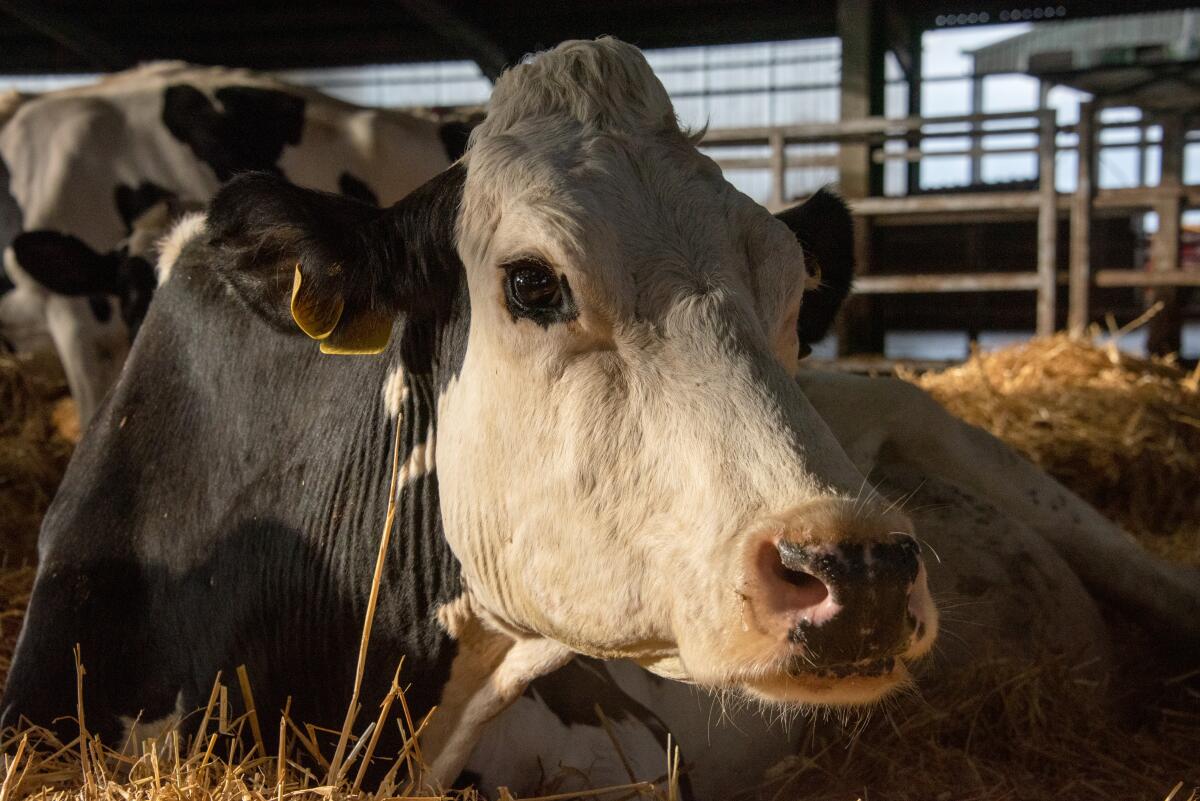Review: Andrea Arnold takes an unflinching, cinematic look at dairy life in ‘Cow’

- Share via
One might not expect Andrea Arnold, the English filmmaker known for her intimately harrowing narrative features “Fish Tank” and “American Honey,” to deliver a dialogue-free nonfiction film examining the life of a farm animal. But after an embattled experience on Season 2 of the HBO series “Big Little Lies,” Arnold has turned away from Hollywood and back to nature, bringing her unflinching sensibility to “Cow,” a carefully considered contemplation of the life of a dairy cow, Luma.
This vérité-style documentary, which debuted at the 2021 Cannes Film Festival, opens with a scene of Luma giving birth, a moment that swings from gory to tender and then heartbreaking, as Luma, tenderly licking the goo and slime from her baby, is ushered to the milking stall, afterbirth hanging from her hindquarters. When she returns to her newborn, she squares off with the camera, staring it, and us, down, bellowing for her babe. It’s a confrontation, and just one searing example of the way that Arnold, and cinematographer Magda Kowalczyk, configure the camera as a connection to the emotional and lived experience of the cows, a participant-observer but also an intruder.
For your safety
The Times is committed to reviewing theatrical film releases during the COVID-19 pandemic. Because moviegoing carries risks during this time, we remind readers to follow health and safety guidelines as outlined by the CDC and local health officials.
The life of a dairy cow in “Cow” is an endless parade of intrusions on what we might consider the natural order. Luma’s a working mother, allowed only a nuzzle or two with her baby before the babe is given a rubber udder attached to a pail and Mom is back to be milked or mated with, incongruously set to the tunes of lo-fi contemporary pop ballads. Soon, there will be another baby, ripped from her again. And on and on, and so it goes.
As emotionally devastating as it can be to see mama cows long for their babies, separated and sent to live with the other calves, this farm is one of the good ones. The cows are well-cared for and grass-fed, the farmers knowledgeable, kind and gentle. Arnold is not trying to shock or terrify the viewer (this is not a sensationalist PETA video) but simply offers an invitation to bear witness to what the industrialization of food production means for animals. In our modern lives, we’re divorced from our connection to food production, so the film challenges us to consider our own role in the exploitation and discomfort of these animals.
Although it can be a challenging watch, “Cow” doesn’t necessarily have a specific agenda, and it is not an indictment of the dairy industry. It offers a clear-eyed observation of the process and allows the viewer to decide. The carnage and casual cruelty required to produce food like this is hard to take, but it’s also a reflection of life itself, which can always be rough and beautiful and bloody.
What Arnold manages to make tangibly cinematic in “Cow” is the soulful spirituality of these animals, their beauty and their emotions. It is as moving as it is devastating, and although this film requires patience and fortitude, it rewards with a singular and perspective-shifting cinematic experience.
Walsh is a Tribune News Service film critic.
‘Cow’
Not rated
Running time: 1 hour, 34 minutes
Playing: Starts April 8, Landmark Westwood; Laemmle Playhouse 7, Pasadena
More to Read
Only good movies
Get the Indie Focus newsletter, Mark Olsen's weekly guide to the world of cinema.
You may occasionally receive promotional content from the Los Angeles Times.










